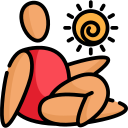Workflows That Reduce Always-On Pressure
Publish response-time norms in onboarding docs and email signatures. Encourage threads, summaries, and clear subject tags. Reduce ping-pong messages by asking for context and decisions. Share your template and help our community standardize healthier remote collaboration practices.
Workflows That Reduce Always-On Pressure
Group meetings into two weekly blocks respecting both your timezone and clients’. Record calls, send concise recaps, and protect non-meeting days fiercely. Tell us which batching strategy delivered the biggest energy return during your last multi-city sprint.







